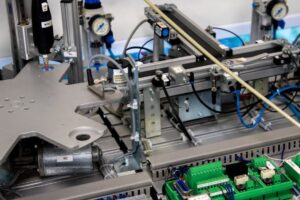
Image Source: Shutterstock
In recent years, the world has witnessed a remarkable transformation in various industries as sustainability and environmental consciousness have taken centre stage. One significant sector experiencing a paradigm shift towards greener practices is the field of electrician services.
From renewable energy integration to energy-efficient technologies, electricians globally are playing a crucial role in fostering a more sustainable and eco-friendly future.
Renewable Energy Integration:
One of the key contributors to the greening of electrician services is the increasing integration of renewable energy sources. Electricians are at the forefront of installing and maintaining solar panels, wind turbines, and other clean energy systems. The transition to renewables not only reduces dependence on fossil fuels but also helps in lowering carbon emissions, contributing to the fight against climate change.
Energy-Efficient Technologies:
Advancements in technology have paved the way for energy-efficient solutions across various sectors, and electrician services are no exception. Electricians are now actively involved in the installation and maintenance of energy-efficient lighting systems, smart thermostats, and other devices designed to optimise energy consumption. These technologies not only benefit the environment but also lead to substantial cost savings for consumers in the long run.
Electric Vehicle Charging Infrastructure:
The rise of electric vehicles (EVs) is a significant driver of greener electrician services. Electricians are crucial in the development of EV charging infrastructure, ensuring that charging stations are installed efficiently and effectively. The expansion of charging networks supports the global shift towards sustainable transportation, reducing reliance on traditional gasoline-powered vehicles and curbing air pollution.
Waste Reduction and Recycling:
Green electrician services also extend to the responsible disposal of electronic waste (e-waste). As technology evolves, the need for proper recycling and disposal of outdated electrical equipment becomes crucial. Electricians are increasingly involved in the proper handling and recycling of e-waste, ensuring that hazardous materials are disposed of responsibly and valuable resources are recovered for reuse.
Education and Training:
To meet the growing demand for greener electrician services, education and training programs are evolving to incorporate sustainable practices. Electricians are being equipped with the knowledge and skills needed to work with renewable energy systems, energy-efficient technologies, and environmentally friendly materials. This ensures that the workforce is prepared to meet the challenges of a rapidly changing and greener industry.
Government Incentives and Regulations:
Governments worldwide are recognising the importance of transitioning to greener practices and are implementing incentives and regulations to promote sustainability. Electrician services are often subject to these regulations, which encourage the adoption of eco-friendly technologies and practices. Incentives such as tax credits for renewable energy installations and energy-efficient upgrades further motivate both electricians and consumers to embrace greener solutions.
Innovations in Energy Storage:
Another area where electrician services are making strides in sustainability is in the field of energy storage. Electricians are increasingly involved in the installation and maintenance of advanced energy storage systems, such as lithium-ion batteries and other emerging technologies. These systems help store excess energy generated from renewable sources during periods of low demand, making it available when needed. Efficient energy storage solutions contribute to the stability and reliability of renewable energy systems, further promoting their widespread adoption.
Remote Monitoring and Smart Grids:
The integration of remote monitoring and smart grid technologies is empowering electricians to optimise energy distribution and consumption. Smart grids enable real-time monitoring and control of electrical systems, allowing for more efficient utilisation of energy resources. Electricians play a crucial role in implementing these technologies, ensuring that electrical grids are intelligent, resilient, and capable of adapting to changing energy demands while minimising environmental impact.
Green Certification and Standards:
To further promote sustainability in electrician services, industry-specific green certifications and standards have emerged. These certifications validate that electricians adhere to environmentally friendly practices, use energy-efficient materials, and follow proper disposal and recycling procedures. Adhering to these standards not only helps electricians showcase their commitment to sustainability but also builds trust with environmentally conscious clients.
Community Engagement and Awareness:
Electricians are increasingly engaging with local communities to raise awareness about the benefits of green practices. Workshops, seminars, and community outreach programs educate the public on energy conservation, renewable energy options, and the environmental impact of electrical systems. By fostering a sense of environmental responsibility within communities, electricians contribute to the broader effort of creating a sustainable and eco-conscious society.
Collaboration and Partnerships:
The shift towards greener electrician services is not only driven by individual efforts but also by collaborative initiatives. Electricians are forming partnerships with renewable energy companies, environmental organisations, and government agencies to collectively address sustainability challenges. These collaborations facilitate knowledge exchange, technological innovation, and the development of best practices that contribute to the overall advancement of green electrician services.
Continuous Research and Development:
The field of electrician services is dynamic, and continuous research and development are essential for staying at the forefront of sustainability. Electricians are actively involved in researching new materials, technologies, and methodologies that can enhance the environmental performance of electrical systems. This commitment to innovation ensures that the industry remains adaptable to emerging challenges and opportunities in the pursuit of a greener future.
Conclusion:
As the world faces the urgent need to address climate change and environmental degradation, electrician services are emerging as a vital force in promoting sustainability.
Through technological advancements, education, collaboration, and a commitment to green practices, electricians are contributing significantly to the global effort to build a more sustainable and eco-friendly future.
The ongoing evolution of the industry holds promise for continued innovation and positive environmental impact, making greener electrician services a cornerstone of the broader transition to a low-carbon and sustainable society.



